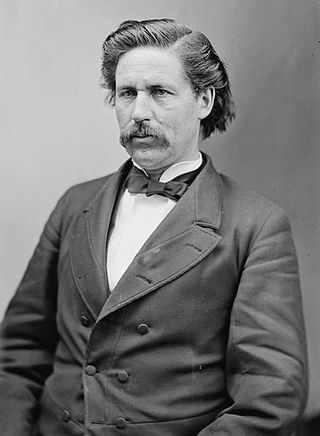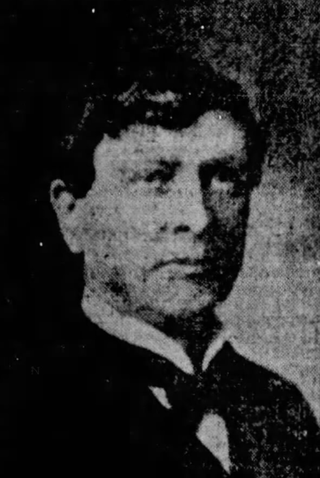
Houlton is a town in and the county seat of Aroostook County,Maine,United States,on the Canada–United States border. As of the 2020 census,the town's population was 6,055. It is perhaps best known for being at the northern terminus of Interstate 95 and as the birthplace of Samantha Smith,a goodwill ambassador as a child during the Cold War. The town hosts the annual Houlton Agricultural Fair.

The Massachusetts Supreme Judicial Court (SJC) is the highest court in the Commonwealth of Massachusetts. Although the claim is disputed by the Supreme Court of Pennsylvania,the SJC claims the distinction of being the oldest continuously functioning appellate court in the Americas,with a recognized history dating to the establishment of the Massachusetts Superior Court of Judicature in 1692 under the charter of the Province of Massachusetts Bay.

Edward Kent was an American attorney and politician who served as the 12th and 15th Governor of Maine. He was among the last prominent members of the Whig Party in Maine before it collapsed in favor of the Republicans. He is the only Maine governor to have been elected to two non-consecutive terms,though his second term was through direct appointment by the Whig-dominated Maine Legislature.
James Putnam Archibald was a judge of the Maine Supreme Judicial Court.
The Maine Superior Court is the trial court of general jurisdiction in the Maine state court system.

Llewellyn Powers was a U.S. Representative from Maine and the 44th Governor of Maine.
Reading law was the primary method used in common law countries,particularly the United States,for people to prepare for and enter the legal profession before the advent of law schools. It consisted of an extended internship or apprenticeship under the tutelage or mentoring of an experienced lawyer. The practice largely died out in the early 20th century. A few U.S. states,namely California,Maine,New York,Vermont,Virginia and Washington,still permit people to become lawyers by reading law instead of attending some or all of law school,although the practice is rare.

Warren Coffin Philbrook was a justice of the Maine Supreme Judicial Court and Attorney General of Maine. A Republican,Philbrook served in a variety of political,legal,and judicial roles throughout the U.S. State of Maine throughout his career. Philbrook was a Freemason and a member of the Knights of Pythias,where he served as Chancellor Commander of Maine.
Daniel Everett "Dan" Wathen is a Maine lawyer and politician. He was Chief Justice of the Maine Supreme Judicial Court from March 1992 until October 2001,when he resigned to run for Governor of Maine as a Republican. At the time of his announcement,many pollsters and academics did not believe Wathen would factor into the 2002 gubernatorial election. He was replaced as chief justice by Leigh Saufley.

Dow v Black is a Canadian constitutional law decision. Decided in 1875,it was one of the first major cases examining in detail the division of powers between the federal Parliament and the provincial Legislatures,set out in the Constitution Act,1867. The issue was whether a provincial statute which authorised the municipality of St. Stephen,New Brunswick to issue a debenture to fund a railway connecting to the United States was within provincial jurisdiction as a local tax matter,or whether it intruded on federal jurisdiction over inter-provincial and international railways.

The Houlton Band of Maliseet Indians of Maine (HBMI) is a federally recognized tribe of Maliseet,whose land is along the Meduxnekeag River in Maine,United States. They are headquartered in Littleton,Maine,located in Aroostook County.

Frederick Alton Powers was Attorney General of Maine from 1893 to 1897 and a justice of the Maine Supreme Judicial Court from January 2,1900 to 1907.
George H. Worster was a justice of the Maine Supreme Judicial Court from December 21,1939 to July 31,1942.
Jonathan Garland Dickerson,of Belfast,Maine,was a justice of the Maine Supreme Judicial Court from October 24,1862,to September 1,1878.

Joseph White Symonds,of Portland,Maine,was a justice of the Maine Supreme Judicial Court from October 16,1878,to March 31,1884.
Nathaniel Tompkins was an American politician and jurist from Maine. Tompkins,a Republican,was elected to five terms in the Maine Legislature,including three in the Maine House of Representatives and two in the Maine Senate. During his tenure in the House,he served as House Speaker in 1935–1936. In 1938,he was elected to the Maine Senate. After being re-elected in 1940,Tompkins was elected by his fellow State Senators to be Senate President. He was appointed as a circuit court judge mid-way through his only term as President. Four years later,on July 27,1945,he was appointed to the Maine Supreme Judicial Court. He served in that position until his death in April 1949. He died in the Aroostook County Court House in Houlton.

Brigadier General Frank M. Hume was the commanding officer of the 103rd Infantry,26th Division during World War I. Hume was involved in the Spanish–American War and World War I. He earned the Army Distinguished Service Medal for his service,as well as the Croix de Guerre.

Frank George Farrington was an American lawyer and politician from Maine. Farrington,a Republican from Augusta,severed four terms in the Maine Legislature,including two in the Maine House of Representatives and two in the Maine Senate. He lost the Republican gubernatorial primary in 1924 to Ku Klux Klan-backed Ralph Owen Brewster by just 581 votes.
David Glendenning Roberts,of Portland,Maine,was a justice of the Maine Supreme Judicial Court from January 11,1980,to August 31,1998.











